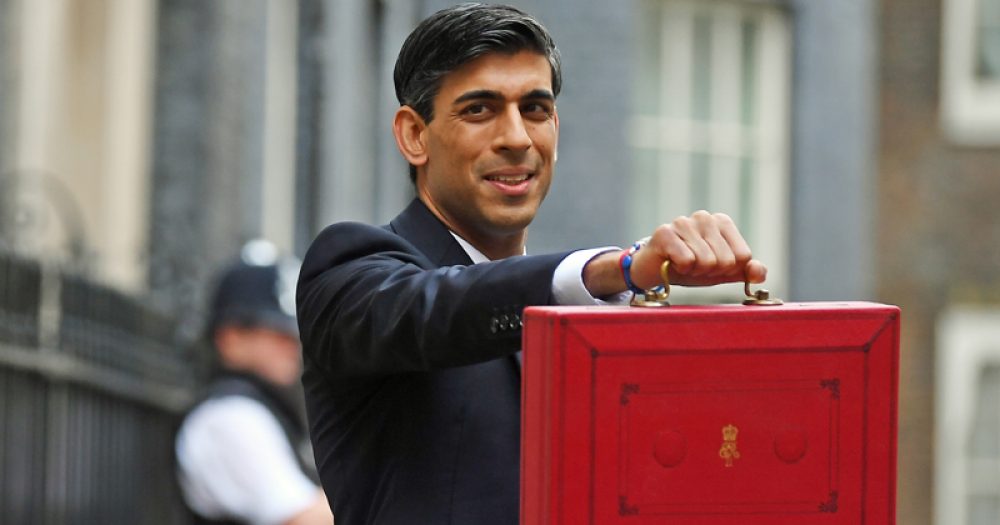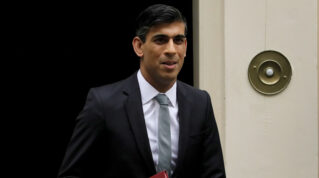The chancellor Rishi Sunak has promised to lift the pay freeze for school staff in Wednesday’s budget and spending review.
The promise of a wage rise for hundreds of thousands of school staff is the latest in a series of announcements trailed ahead of the set-piece speech in the Commons.
However Sunak’s decision to pre-announce several measures has already led to a rebuke from Commons speaker Lindsay Hoyle, who said it was “not acceptable” to brief journalists before MPs
Here is what we know so far:
1. Pay freeze scrapped …
A pay freeze imposed last year on school leaders, teachers and support staff earning more than £24,000 is due to be scrapped.
Sunak claimed the freeze had “helped us protect livelihoods” during the pandemic and curbed the private-public wage gap, but said rises were justified with the economy now “back on track”.
The Treasury said increases would be confirmed next year once the government had responded to the School Teachers’ Review Body’s and other review organisations’ recommendations.
But Paul Whiteman, general secretary of school leaders’ union NAHT, highlighted predictions of four per cent inflation next year mean that any rise below inflation would actually mark a real-terms cut.
The government has already pushed back its promise to raise new teacher salaries to £30,000.
Meanwhile the National Living Wage will also rise from £8.91 to £9.50 per hour.
2. … but uncertainy over whether schools will take hit
Kevin Courtney, joint general secretary of the NEU, called the announcement “big on promises but short on detail”, warning school staff would not know what to expect until 2022.
Paul Whiteman added the “crucial detail” of whether the government would actually fund higher salaries with extra funds is not yet known.
“If schools have to cut elsewhere in their budgets to find the extra money they will be faced with heartbreaking decisions,” he added.
The Department for Education had been asked to find five per cent of savings from its budget, prompting fears that school funding would take a hit.
ASCL said the lifted cap was welcome, but cuts or even “deficit budgets” could be on the cards without extra funds.
NEU joint general secretary Kevin Courtney agreed Sunak must “confirm now” teachers will not be paid more “at the expense of other valuable services”.
The NAHT, NEU and NASUWT unions have also called this week on the government to fully respect the independence of the STRB.
Schools Week has asked the Treasury where funds will come from.
3. £2.6 billion for SEND support
The government has promised £2.6 billion capital investment over the next three years for extra school places for children with special educational needs and disabilities.
The Treasury said it marked a trebling of funding, with more than 30,000 extra places promised across both mainstream and specialist schools.
Part of the cash will be earmarked for improving the accessibility of existing buildings, and some will be used to fund new special and alternative provision free schools. The funds are reported to be new cash.
4. More catch-up cash and longer days look unlikely
Prime minister Boris Johnson may have called education his “biggest priority” after the pandemic, but Sunak played down hopes of extra catch-up cash over the weekend.
Asked about academy leaders’ calls for £5 billion more, Sunak told Times Radio the government had “decided to act in advance” of the spending review with already-announced measures.
He highlighted spending on tutoring and teacher development as areas that “make the biggest difference”, adding: “We have pretty much maxed out on those things.”
It comes in spite of Sir Kevan Collins’ resignation as catch-up tsar over the government’s failure to fund his recovery plans, including lengthening the school day.
Sunak said there wasn’t “as strong evidence” for it as tutoring and teacher training, suggesting longer school day plans could be off the table.
5. Fears of real-terms school budget cuts
The Department for Education was asked last month to find savings of “at least” 5 per cent as part of the spending review, leaving it facing cuts that could amount to £4.5 billion and prompting fears over its toll on schools.
Ministers plan to increase funding for health and social care in the wake of the pandemic by raising national insurance contributions, but are looking to find savings elsewhere.
Spending on schools represents almost two thirds of the Department for Education’s £89.6 billion resource budget.
The Conservatives pledged in 2019 to raise overall school funding by £7.1 billion in cash terms over three years. But that settlement only lasts until 2022-23, whereas the spending review will set out funding plans up to 2024-25.














Interesting to see the pay freeze lifted for schools, but what about the ongoing cost-cutting measures? How will this impact the quality of education? Will there be more funding for teacher training and resources? It’s important to see the long-term implications of this decision and how it will benefit students.
This article offers a concise and insightful look at the 2021 budget and spending review, focusing on pay rises and school funding. It’s a timely and helpful read for educators, providing clarity on what to expect. Well-written and informative!
It’s encouraging that the pay freeze for schools has been lifted, but it raises bigger questions about the broader budget cuts still in place. How will this affect classroom quality and support for both teachers and students? Hopefully, this move signals a shift toward more investment in professional development and educational resources. The real test will be in how it impacts learning outcomes in the long run.